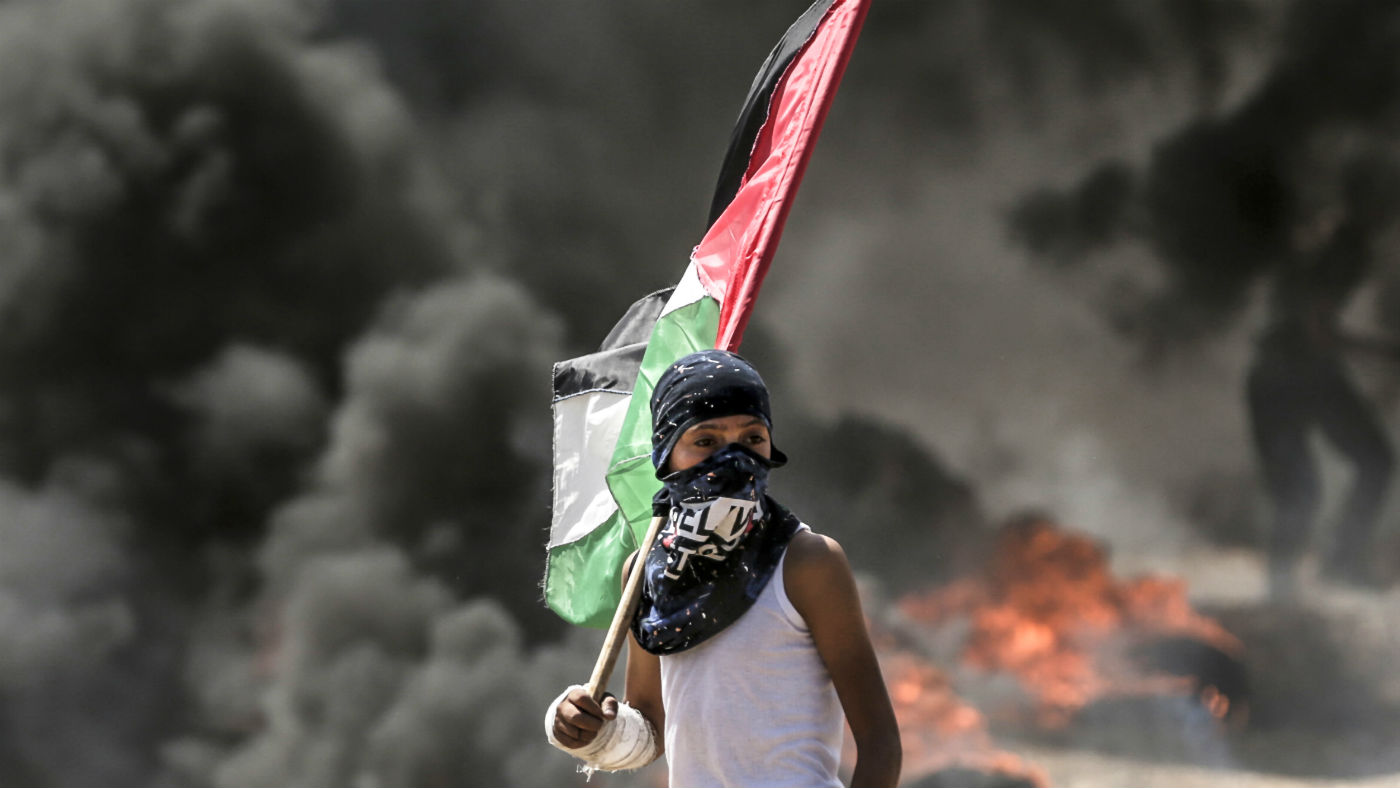Gaza braced for fresh violence after dozens of Palestinians shot dead
‘Great March of Return’ protests against new US embassy in Jerusalem and Israel’s 70th anniversary

A free daily email with the biggest news stories of the day – and the best features from TheWeek.com
You are now subscribed
Your newsletter sign-up was successful
Dozens of Palestinians were killed by Israeli forces yesterday during huge demonstrations against Donald Trump’s decision to move the US embassy in Jerusalem on the 70th anniversary of the creation of Israel.
In a series of skirmishes along the Gaza border involving as many as 35,000 people, the Palestinian Ministry of Health says 55 Palestinians were shot dead by Israeli gunmen. Some 2,700 others were reportedly injured.
It is the largest number of fatalities in a single day since the latest round of protests broke out six weeks ago.
The Week
Escape your echo chamber. Get the facts behind the news, plus analysis from multiple perspectives.

Sign up for The Week's Free Newsletters
From our morning news briefing to a weekly Good News Newsletter, get the best of The Week delivered directly to your inbox.
From our morning news briefing to a weekly Good News Newsletter, get the best of The Week delivered directly to your inbox.
More violence is expected today, as Palestinians mark the anniversary of what they call the Nakba (the “catastrophe”) - the establishment of Israel, which led to thousands fleeing what had been Palestine.
“Tensions will be particularly high in Gaza,” says the BBC, “where funerals for those killed on Monday are due to take place.”
Border clash
Dubbed the “Great March of Return”, yesterday’s protests reached a climax hours before the US opened its new embassy in Jerusalem.
A free daily email with the biggest news stories of the day – and the best features from TheWeek.com
Tens of thousands of protesters had streamed to the coastal enclave’s land border, some approaching the Israeli fence - a line Israeli leaders said Palestinians would not be allowed to breach.
Journalists near the Gaza-Israel border heard gunfire in spurts and saw a tank moving towards the fence in the border area of Malaka, CNN reports. Israeli drones also dropped tear gas over a crowd of protesters.
“Today is the big day when we will cross the fence and tell Israel and the world we will not accept being occupied forever,” one Palestinian protester told Reuters.
Al-Jazeera said one of its reporters was wounded while covering the demonstrations.
The Israel Defence Force (IDF) blamed the protests on the Palestinian militant group Hamas, which controls Gaza, accusing it of “leading a terrorist operation” and inciting protesters to throw Molotov cocktails, burn tires and throw stones at soldiers stationed along the border fence.
In response to the violence along its border wall, the IDF said a fighter jet had struck five “terrorist targets” at a Hamas military training facility in Gaza.
But Israel’s heavy-handed response has drawn sharp condemnation from around the world.
“In theory, at least, the Israeli military’s rules of engagement for demonstrations are largely clear,” says The Guardian’s Peter Beaumont – that soldiers are only permitted to open fire during a demonstration if lives are deemed to be under threat.
In practice, however, what is deemed an appropriate use of force varies widely. Israel’s interpretation of the rules had already been criticised by a senior UN official and Israeli human rights groups even before yesterday’s deaths.
-
 Quiz of The Week: 14 – 20 February
Quiz of The Week: 14 – 20 FebruaryQuiz Have you been paying attention to The Week’s news?
-
 The Week Unwrapped: Do the Freemasons have too much sway in the police force?
The Week Unwrapped: Do the Freemasons have too much sway in the police force?Podcast Plus, what does the growing popularity of prediction markets mean for the future? And why are UK film and TV workers struggling?
-
 Properties of the week: pretty thatched cottages
Properties of the week: pretty thatched cottagesThe Week Recommends Featuring homes in West Sussex, Dorset and Suffolk
-
 Will increasing tensions with Iran boil over into war?
Will increasing tensions with Iran boil over into war?Today’s Big Question President Donald Trump has recently been threatening the country
-
 Corruption: The spy sheikh and the president
Corruption: The spy sheikh and the presidentFeature Trump is at the center of another scandal
-
 Rubio boosts Orbán ahead of Hungary election
Rubio boosts Orbán ahead of Hungary electionSpeed Read Far-right nationalist Prime Minister Viktor Orbán is facing a tough re-election fight after many years in power
-
 Greenland’s capital becomes ground zero for the country’s diplomatic straits
Greenland’s capital becomes ground zero for the country’s diplomatic straitsIN THE SPOTLIGHT A flurry of new consular activity in Nuuk shows how important Greenland has become to Europeans’ anxiety about American imperialism
-
 Epstein files topple law CEO, roil UK government
Epstein files topple law CEO, roil UK governmentSpeed Read Peter Mandelson, Britain’s former ambassador to the US, is caught up in the scandal
-
 Iran and US prepare to meet after skirmishes
Iran and US prepare to meet after skirmishesSpeed Read The incident comes amid heightened tensions in the Middle East
-
 Which way will Trump go on Iran?
Which way will Trump go on Iran?Today’s Big Question Diplomatic talks set to be held in Turkey on Friday, but failure to reach an agreement could have ‘terrible’ global ramifications
-
 Israel retrieves final hostage’s body from Gaza
Israel retrieves final hostage’s body from GazaSpeed Read The 24-year-old police officer was killed during the initial Hamas attack